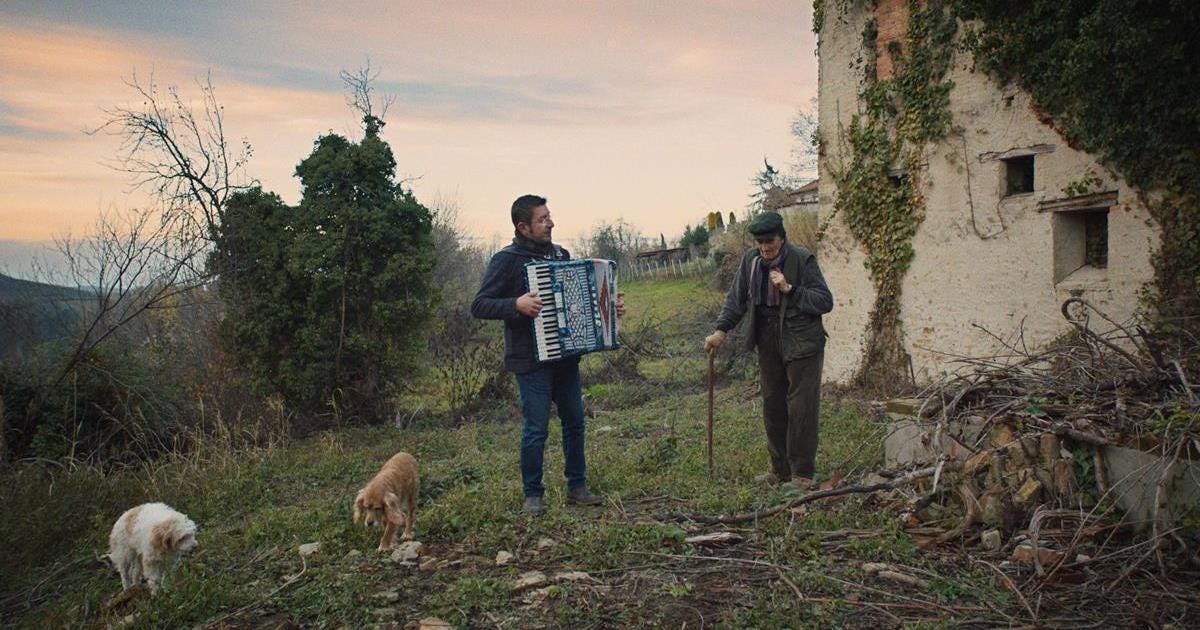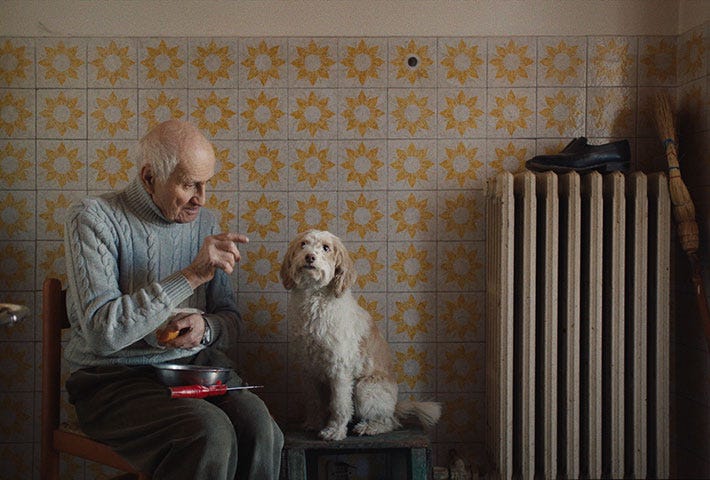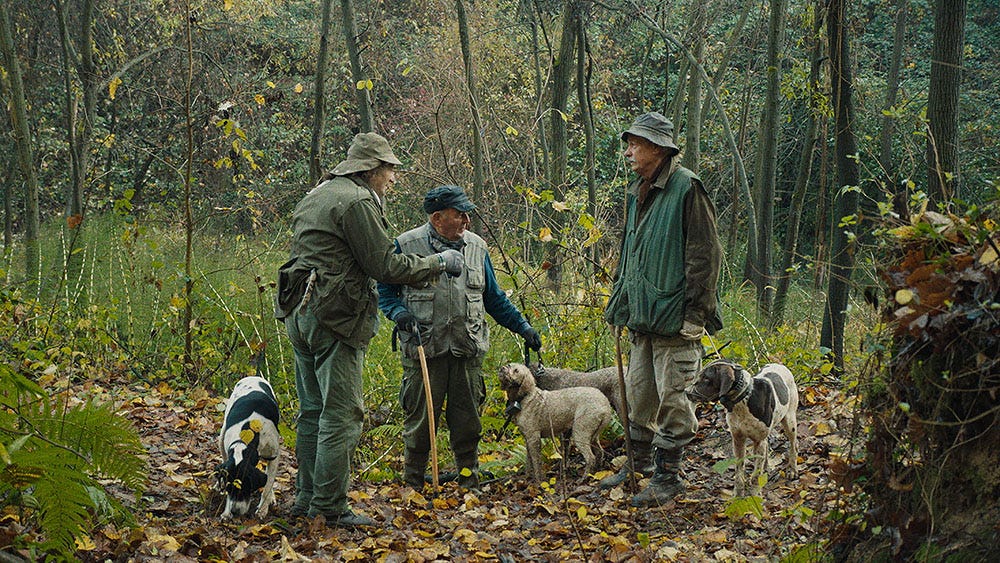D. Nurkse's "The Dog"
Thoughts on dogs, missing centers, and a documentary about old Italian men who love their dogs.
The Dog
At twilight we walk each other
in the snowy park.
The leash yanks us apart.
Our trails mix crazily.
Haven’t we always traveled
in a series of lunges
away from a missing center?
Something we can’t name
obsesses us at the plinth
of the frozen birdbath,
and again under the belly
of Sherman’s bronze horse.
Is there a secret passage
to squeeze through and be free
of the endless command?
We shout heel, our voice
slurs with longing, at last
we’ll enter our own lit door
and there undo our studded collar,
mete out stale friskies, comb
matted hair, turn three times
on nothing, and whimper
in a dream whose ending
everyone knows but us.
from The Fall (Knopf, 2002)
It’s about time for a dog poem. You have to love a dog poem. If you don’t love dog poems, you don’t have a soul. Okay, I’m sorry. That was mean. But if you don’t love dog poems, maybe like, what, one-sixteenth of your soul was taken from you in some other life? Or while you were sleeping, or just like one time when you got up from your chair and left part of your soul behind. Which happens, it’s true. To all of us. But in order to get it back — that one-sixteenth of your soul that might allow you to love a dog poem again, or for the first time — you need to sit in a park and watch a dog do that thing where they smile really quickly and then go back to panting and then smile really quickly again.
Dog poems are a whole genre. Ruth Awad and Rachel Mennies recently edited a whole anthology about them. One of my favorite dog poems is by Hanif Abdurraqib, particularly these opening lines:
Darlings, if your owners say you are / not usually like this / then I must take them / at their word / I am like you / not crazy about that which towers before me
Today’s poem is a dog poem literally titled The Dog, written by D. Nurkse, who is my answer, perhaps, to the question that I never get asked but would love to get asked: which poet —who doesn’t already have a collected or selected poems published — would you love to see publish an edition of their collected or selected poems? My answer would be D. Nurkse, whose work is such a touchstone for me and such a remarkable example of observation and tenderness. So many of his poems feel like someone speaking softly beside you — maybe you were just staring off into the sky beyond Brighton Beach and then this gentle figure sort of appeared next to you and stared with you and told you something, almost trailing off, and then walked away. That’s what it’s like to read D. Nurkse.
I should say, too, that Nurkse was my first and only poetry workshop teacher. I began my MFA as a fiction writer and then moonlighted as a poet toward the end of it. I don’t really know what I got an MFA in, to be honest. My thesis was a bunch of short stories intermixed with poems, like when you order eggs and hash browns at a diner and then end up slathering ketchup over everything and not knowing what’s going to be in the next bite. Imagine 120 pages of that. That was my fault, not Nurkse’s. He was a lovely teacher.
Anyways, D. Nurkse, a real tender poet, whose work I adore. If you don’t know where to start, I’d recommend A Night in Brooklyn, the final poem of which ends with this stanza:
if this is happiness,
how shall we leave it,
if this is grief, how to enter it,
if this is just a rented room,
where are the doors, the stairs,
the streets, the endless city.
It’s hard not to hear shades of Larry Levis in such a stanza — a lit, & silent city. Both poets feel perpetually engaged in the act of turning, whispering to themselves some alternation between is this it, is this all there is? and this is it, this is all there is.
Nurkse also conjured one of my favorite images, in his poem “The Long Struggle Against the Mind”:
we were elms
with zippers, who knew they would die
That kind of image work is at the heart of today’s poem, which operates, on a craft level, with an almost formulaic precision that I, as a reader, am a sucker for. It goes something like this:
Image/Action
Image/Action
Existential question
Image/Action
Image/Action
Existential question
Image/Action
Image/Action
Image/Action
Accumulation of all the above images and actions that results in a kind of absolute sorrow
The detail of each image and action allows for the poem to exist within a situation that feels so specific that it bursts with the universal. It’s like the poem digs a hole to the center of the earth and then digs another. To me, the other beautiful craft move is Nurkse’s choice to situate this poem in the first person plural, which unites the speaker and the dog, and makes them one single character — which, if you’ve ever walked a dog who also liked to walk themselves, is also an apt way of conveying that relationship. You notice that from the first line:
At twilight we walk each other
That we holds so much power as the poem progresses. Early in the poem, it feels almost like a cute choice, a way to express the feeling of walking a dog, but not something inherently meaningful in an existential sense. But, as the poem continues, that we narrows its own distance between the speaker and the dog until both the speaker and the dog exist as a unified plurality. The voice that slurs with longing is a dog’s voice, but also a human’s. The lit door marks the entrance to the dog’s abode, but also the human’s. And the dream finally, that we fall asleep to, after the anxiety of turning and turning on nothing, is the same dream, one dreamed by both dog and human. It’s a dream that ends, ultimately and finally, in death, but before that, it ends in waking and in repeating, waking and repeating.
As such, the questions that are posed within this poem are questions that extend to our collective — and deeply human — life. I think what first drew me to this poem was that first question, which stunned me:
Haven’t we always traveled
in a series of lunges
away from a missing center?
You could spend forever unpacking this question within the context of the poem. First, it’s impossible not to think of Yeats — things fall apart; the centre cannot hold. Though, it feels like Nurkse’s question develops on Yeats’ line, potentially furthering it. Perhaps there was no center to begin with. Or perhaps it’s just, well, missing. And secondly, if we frame this question from the point of view of someone walking a dog, then it’s the dog who is traveling in a series of lunges, and it’s us — us humans — who are the missing center that the dog lunges away from. Goddamn. And then thirdly, if we hold the we of the poem as something that contains both the dog and the human, then humans are not just the missing centers, but we are also the ones lunging away from the absence we have created. So yeah, it’s a fucking question, and it’s perhaps a question that illustrates the way both collective society and individual experience feel like today better than any other question I’ve encountered.
I think one reason that question stunned me so viscerally upon reading it was the fact that it voiced what it often feels like to be flailing about in this world. Maybe Yeats was wrong. Maybe there was no center to begin with. Or maybe he was right, and the center collapsed. And what was left in its absence was the way it feels to lunge for so much — power, validation, joy, hope — even if what you are lunging for — like power, like validation — is inherently endowed with a kind of vacuous emptiness. An empty emptiness, if you will. Sometimes being alive feels like lunging from a place of nothing towards what must be something, and then arriving and realizing that what you thought was something is just another absence of a center. And where do you go from there? There’s no center to return to. There’s just empty space.
And the sorrow of what I just said, combined with the fact that today’s poem is a dog poem, makes me want to talk about this documentary I saw about a month ago with my friends Bud and Michael and Jimmy. It was called The Truffle Hunters, and it detailed the story of a few old men and their beloved dogs as they foraged for truffles in Piedmont, Italy. It was a beautiful movie. Beautiful is such a mediocre word to describe it. It was one of my favorite films I’ve ever seen.
This was in part because of the subject matter. The film detailed relationships — between men and their dogs, people and the earth — that felt so pure that they almost felt fictional. And it was also because of the film’s delivery. There was no overarching narrative voice, nothing expressly linking each scene other than the images themselves. As such, viewing the film felt more like witnessing than what viewing a film often feels like: watching and hearing. Also, the cinematography. Look:
But overall, the main power of the film was its heart. There was heart, so much of it. The heart of these old men and the love they had for what they spent their days doing — foraging for truffles — and for who they spent their days with — these lovely, sacred pups. The reach of capitalism shows its hand throughout the movie. The truffles that the men foraged for are haggled and shortchanged for in dark alleys and then sold later by men in suits for exorbitant sums. Other people come to this small town and try to poison dogs and rummage through the earth for the truffles themselves. But the men of the film — old, Italian, and stubborn — resist always this breach of their center. One man throws himself onto a typewriter to compose a manifesto about the death of the sacred art and work of truffle hunting, chain smoking into his eighty-year beard as he does it. Another sneaks out at night to forage for truffles under the nothing-light of moon with his dog, who was blessed by the local priest. Another lets his pup hop onto his dinner table and lick what’s left of his bowl of broth.
At one point, the directors strap a GoPro to a dog’s head, and for a few frantic, joyful moments, viewers are spellbound by the kind of raucous energy that emanates from the dog as they go out sniffing around for truffles, which must, if a dog’s sense of smell is upwards of 10,000 times more pronounced than a humans, be such a wild fucking thing. It must be like sniffing around for heaven itself. And the camera tells that story. There’s a frantic energy. A search, always, for something beautiful. There is no still moment. For a few minutes, the leash is off, and the dog isn’t lunging around just for anything — no, they’re living, in their purest fucking form.
That kind of love and passion is transcendent. It’s the kind of thing that makes you realize that our world is composed of so many possible worlds and so many impossible ones. I think, perhaps, that the world we live in is an impossible one. It’s a world that claims it is without limits, where billionaires race to space and people eager for money or power intrude on the lives of people who are simply eager for love. So many people lunging away from so many missing centers. I think, though, that our world can sustain many possible worlds. They already exist. They are in small Italian villages. They are in homes and in parks and gathered around tables. They are in the few hours someone spends doing something they love, simply because they love. But I don’t think our world — full of so many possible worlds — can sustain even one impossible one. That is one of the scariest things about being alive today. People often look so far elsewhere when there is so much here.







